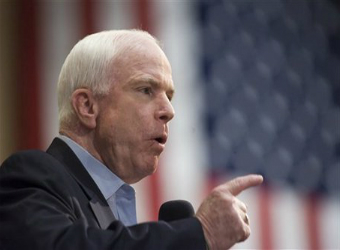Egypt on Thursday defended a new law on non-governmental organisations that three U.S. Republican senators have called “draconian” and a sign of “a growing crackdown on human rights and peaceful dissent.”
UN High Commissioner for Human Rights Zeid Ra’ad Al Hussein also criticized the law, saying it “effectively hands administration of NGOs to the government”.
The law, issued on Monday after being ratified by President Abdel Fattah al-Sisi, restricts NGO activity to developmental and social work and introduces jail terms of up to five years for non-compliance.
Egyptian lawmakers said the law was necessary to protect national security. The government has long accused human rights groups of taking foreign funds to sow chaos and several are facing investigation over their funding.
Cairo’s foreign ministry denied the law aimed to restrict NGOs and said some of them “have gotten used to working outside the law … to defame the image of civil society in Egypt”.
In Washington on Wednesday, Senators John McCain and Lindsey Graham said in a joint statement: “President al-Sisi’s decision to ratify the draconian legislation … that regulates the work of non-governmental organizations is the latest sign of a growing crackdown on human rights and peaceful dissent in Egypt.”
McCain, who is chairman of the Senate Armed Services Committee, and Graham said the U.S. Congress should in response “strengthen democratic benchmarks and human rights conditions on U.S. assistance for Egypt.”
That sentiment was echoed by Senator Marco Rubio, a member of the Senate Foreign Relations Committee, who said the law would have a “terrible impact” on Egypt’s ability to make reforms and would have implications for U.S.-Egypt relations.
“This law is a direct attack on independent civil society in Egypt,” Rubio said in a statement.
The UN human rights chief Zeid said on Thursday that the new law makes rights defenders even more vulnerable than before.
“The crucial function of these NGOs – to hold the state accountable for its human rights obligations – has been severely hampered already through asset freezes, travel bans, smear campaigns and prosecutions. This new law further tightens the noose,” he said in a statement.
In Egypt’s response, foreign ministry spokesman Ahmed Abu Zeid said: “It is important to be vigilant about the intention of some civil society entities that have gotten used to working outside the law, and that were harmed by the issuing of the new law, to defame the image of civil society in Egypt.”
Egypt is one of Washington’s closest allies in the Middle East, receiving $1.3 billion in U.S. military aid annually.
U.S. President Donald Trump praised Sisi after a meeting in Saudi Arabia last week, saying the Egyptian leader had “done a tremendous job under trying circumstance.”
In the context, the European Union (EU) criticised Thursdy Egypt’s ratified law that restricts the work of NGOs in the country, Anadolu Agency reported, quoting an official statement released by the EU. There are currently more than 47,000 NGOs, some foreign-funded, which operate across Egypt.
The EU warned of the “negative impact” of the law on joint cooperation with the Egyptian government, especially in relation to “European aid to Egypt under the various European cooperation agreements with Cairo,” the majority of which depend on the NGOs as a significant implementing partner.
According to the statement the bill would strictly control the activities of the NGOs in developmental and social work and would make it difficult for charities to deliver services. It also bans domestic and foreign groups from taking part in funding activities or anything that can be said to “harm national security, public order, public morals or public health”.
The bloc called on Egyptian authorities to abide by all the guarantees stipulated in the Egyptian Constitution including international standards of freedom of expression and the formation of NGOs. They have also demanded Egypt implement the new law without imposing restrictions on civil society organisations’ developmental work and that they respect human rights.
Source: Reuters and Middle East Monitor


